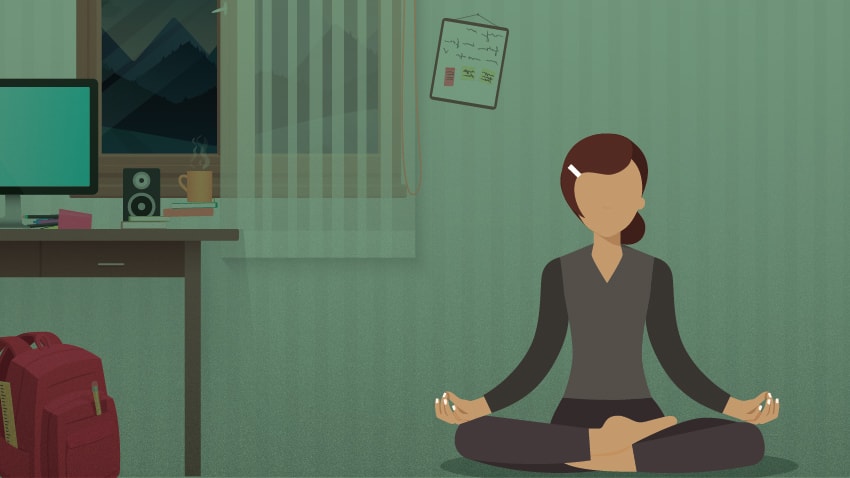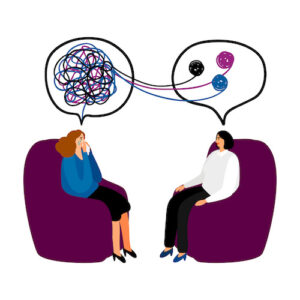Do you constantly worry about time? Do you feel like you’re always running out of time? If so, you may be struggling with time OCD. This is a form of OCD that involves an irrational fear of time. People with this disorder often feel like they can’t keep up with the world, and they become overwhelmed by the thought of time passing them by. If this sounds like you, don’t worry – there is hope! In this article, we will discuss the symptoms and treatment options for time OCD. We will also provide some helpful tips for managing your anxiety.
Contents
What Is Time OCD?
 Time OCD is a subtype of OCD that is characterized by an irrational fear of time. People with Time OCD are obsessed with the passage of time and often have a hard time enjoying the present moment. They may worry about wasting time, running out of time, or not having enough time to do things. Time OCD can also involve feeling like one must do certain things in a certain order or within a certain timeframe.
Time OCD is a subtype of OCD that is characterized by an irrational fear of time. People with Time OCD are obsessed with the passage of time and often have a hard time enjoying the present moment. They may worry about wasting time, running out of time, or not having enough time to do things. Time OCD can also involve feeling like one must do certain things in a certain order or within a certain timeframe.
Time OCD can be a very debilitating condition that interferes with daily life. If you have Time OCD, you may find it difficult to relax and enjoy your hobbies or spend time with loved ones. You may feel like you’re always rushing around and never have enough time to get everything done. The good news is that there are treatment options available that can help you manage your Time OCD and live a more fulfilling life.
If you or someone you know is struggling with Time OCD, there are a few things you can do to help. First, it’s important to seek professional help from a mental health provider who specializes in OCD. Cognitive-behavioral therapy (CBT) is an effective treatment for OCD, and it can be helpful to work with a therapist who is experienced in treating this type of OCD. In addition, medication may also be prescribed by a psychiatrist to help manage the symptoms of Time OCD.
Signs of Time OCD

There are many signs and symptoms of Time OCD. Some people with Time OCD may:
Obsessively Checking Clock and Calender
One of the most important things to remember if you think you might have Time OCD is that not everyone experiences the same symptoms. Some people with Time OCD may obsessively check the clock or calendar, while others may avoid looking at a time altogether. There may also be many different triggers for Time OCD obsessions and compulsions.
Worrying About Wasting Time
People with Time OCD often worry about wasting time. They may feel like they need to spend every minute of the day doing something productive. This can lead to a lot of stress and anxiety, as well as feelings of guilt and inadequacy.
Feeling Like There’s Never Enough Time
Another common symptom of Time OCD is feeling like there’s never enough time. People with this condition may have a hard time enjoying the present moment because they’re always worrying about the future. They may also try to pack too much into their day, which can lead to even more anxiety and stress.
Constant rushing
If you have Time OCD, you may find yourself constantly rushing around. This can make it difficult to relax and enjoy your hobbies or spend time with loved ones. You may feel like you’re always under pressure to get things done. There may also be a lot of conflict in your relationships as a result of your constant rushing.
Trouble enjoying activities
People with Time OCD often have a hard time enjoying activities. This is because they’re so focused on the passage of time and how much time they have left to do things. They may also feel like they need to hurry up and finish an activity so that they can move on to the next thing. It may also mean that you don’t get as much out of an activity as you could because you’re so focused on the clock.
Constant planning
If you have Time OCD, you may find yourself constantly planning for the future. This can be a way to try to control the passage of time and make sure that you’re doing everything within a certain timeframe. However, it can also lead to a lot of anxiety and stress. Sometimes it also means that you don’t live in the present moment as much as you could.
These are just a few of the signs and symptoms of Time OCD. If you think you might have this condition, it’s important to seek professional help from a mental health provider who specializes in OCD. Treatment can make a big difference in your life.
Causes of Time-OCD

There are many causes of time-OCD, but the most common is a fear of death. Some of these reasons are:
Genetics
Genetics plays a role in time-OCD. If you have a family member with OCD, you’re more likely to develop the condition. This may be because OCD is partly hereditary. Also sometimes there may be many different triggers for Time OCD obsessions and compulsions. Genetics can also make people more likely to develop OCD after a stressful life event. It’s not clear exactly how OCD is passed down from one generation to the next, but it’s thought to be a combination of genetic and environmental factors.
Brain structure
There are differences in the brain structure of people with OCD and those without the condition. People with OCD may have abnormalities in the way that certain chemicals work in their brains. This can make them more likely to develop OCD.
In brain structure abnormalities a certain area in the front of the brain, called the anterior cingulate cortex, is smaller in people with OCD. This area of the brain is thought to be involved in error detection and making decisions.
Environmental factors
There are also environmental factors that can play a role in developing Time OCD. For example, if you experience a lot of stress in your life, you may be more likely to develop OCD. This is because stress can trigger the body’s fight-or-flight response. The fight-or-flight response is a natural reaction that happens when we feel threatened. It causes a surge of hormones, like adrenaline, which can make us feel anxious and stressed. It’s thought that this may contribute to the development of OCD.
Stressful life events
There are also a number of stressful life events that can trigger OCD. These include things like the death of a loved one, divorce, or moving to a new house. It’s thought that these events may cause changes in brain chemistry that make people more likely to develop OCD.
These stressful live events also make it a lot harder to manage OCD symptoms. This is because when we’re under a lot of stress, our OCD symptoms may get worse.
Negative Impacts of Time OCD

Impacting a person’s daily life, Time OCD can make it difficult to stick to a schedule, be on time for appointments, or complete tasks within a certain timeframe. This can lead to problems at work, school, or in personal relationships. Some of these are:
Impacts Relationships
When there are disagreements about time or how it’s used, this can put a strain on personal relationships. If you’re always focused on the clock and rushing to get things done, you may not have as much time for your friends and family. This can make you feel isolated and alone.
It can also be hard to maintain healthy boundaries in relationships when you have Time OCD. This is because you may be worried about how other people are using their time, and you may try to control them. This can lead to conflict and resentment.
Leads to Missed Opportunities
Time OCD can also lead to missed opportunities. If you’re always focused on the clock, you may not take the time to enjoy the moment. You may miss out on things like sunsets, walks in the park, or spending time with loved ones. Sometimes there maybe be an opportunity to do something spontaneous, but you may not take it because you’re worried about how it will fit into your schedule.
Can Cause Financial Struggles
Time OCD can also cause financial struggles. This is because you may spend a lot of money on things that help you save time, like fast food or online shopping. You may also miss out on work opportunities or promotions because you can’t stick to a schedule. Sometimes there may be many missed opportunities because of this. Sometimes there also may be a lot of financial struggles.
Gives You a False Sense of Control
Time OCD can also give you a false sense of control. This is because you may feel like you have to be in control of the time in order to avoid anxiety or stress. But the truth is, you can’t control time. Time will always keep moving, no matter what you do. Sometimes there may be many things out of your control.
Makes You Miss Out on Life
Time OCD can also make you miss out on life. This is because you may spend so much time worrying about the time that you don’t have time to live your life. You may miss out on experiences and memories that you’ll never get back.
If you’re struggling with Time OCD, it’s important to seek help from a mental health professional. They can help you understand your thoughts and feelings, and they can provide you with tools to manage your symptoms. With treatment, you can learn to control your OCD and start living a more fulfilling life.
Diagnosis of Time OCD
The diagnosis of time OCD is not always easy. This is because the symptoms can be similar to other anxiety disorders and OCD sub-types. For example, people with time OCD may also have contamination OCD or may be obsessed with numbers and symmetry. As a result, it is important to see a mental health professional who is experienced in diagnosing and treating OCD.
There are some key signs that may indicate that someone has time OCD. These include:
– A preoccupation with time – this can manifest as constantly checking the time, feeling anxious about wasting time, or being late for appointments
– An inability to stick to a routine – people with time OCD often find it difficult to follow a set schedule or plan
– Perfectionism – people with time OCD may be excessively concerned with doing things perfectly or on time
– Excessive worry about the future – people with time OCD may constantly worry about what will happen in the future, or how they will cope with future events
– A need for control – people with time OCD often feel the need to control their environment and those around them
There are some self-tests that can be found online that can help to give you an idea of whether you may have time OCD. However, it is important to remember that these are not a substitute for a professional diagnosis.
There should be a professional diagnosis of Time OCD in order to rule out other disorders with similar symptoms. The professional diagnosis can be difficult because the symptoms might be similar to other Obsessive-Compulsive Disorders or anxiety disorders. People with Time OCD often have contamination OCD or could be obsessed with numbers and symmetry. If you think you might have Time OCD, the best thing to do would be to take one of the self-tests online; however, these are not substitutes for a professional diagnosis. A mental health professional can give an accurate diagnosis and offer different types of treatments.
Treatment of Time OCD

Treating Time OCD is much like treating other types of OCD. The most effective treatment is a combination of medication and therapy and many other treatment options that focus on the individual.
Medications
Medications are often used to treat OCD. The most common type of medication is a selective serotonin reuptake inhibitor (SSRI). SSRIs are a type of antidepressant that can help to increase levels of serotonin in the brain. Serotonin is a chemical messenger that plays a role in mood and anxiety.
Some examples of SSRIs include:
– Fluoxetine (Prozac)
– Sertraline (Zoloft)
– Paroxetine (Paxil)
– Fluvoxamine (Luvox)
There are other types of medications that can be used to treat OCD, such as tricyclic antidepressants and antipsychotics. However, these medications tend to be less effective and can have more side effects than SSRIs.
Therapy

Therapy is another effective treatment for OCD. The most common type of therapy is cognitive-behavioral therapy (CBT). CBT is a type of therapy that helps to change the thinking patterns and behaviors that contribute to OCD.
There are other types of therapies that can be used to treat OCD, such as exposure and response prevention (ERP) and Acceptance and Commitment Therapy (ACT).
Cognitive Behavioral Therapy
Cogntive Behavioral Therapy is when a therapist and the person with OCD meet to discuss and change the thinking patterns and behaviors that contribute to OCD. Also, people with OCD are taught how to better handle their anxiety and OCD symptoms. In CBT, the therapist will work with the person to come up with a list of feared activities (exposure) and then help them slowly face those activities (response prevention).
Exposure and Response Prevention
Exposure and response prevention (ERP) is a type of cognitive-behavioral therapy that helps people manage their anxiety by learning to face their fears. ERP involves gradually exposing yourself to the things that trigger your anxiety, while at the same time learning healthy ways to cope with the fear and anxiety.
For people with time OCD, this may involve exposure to activities or situations that involve time pressure or deadlines. This may be done in small steps, such as setting a timer for one minute and then gradually increasing the amount of time. As you become more comfortable with the activity, you can begin to add more challenges, such as working against a clock or under time pressure.
Acceptance and Commitment Therapy
Acceptance and Commitment Therapy, or ACT, is a type of cognitive-behavioral therapy that has shown to be effective in treating OCD. ACT focuses on helping people accept their thoughts and feelings without judgment, and commit to taking action in line with their values. This can be helpful for people with time OCD who are struggling to let go of their fears and live in the present moment. If you think ACT might be right for you, talk to your doctor or mental health professional about finding a therapist trained in this approach.
Family Therapy
Family therapy is a form of treatment that involves all members of a nuclear family. This type of therapy can help to address the underlying causes of OCD, such as family conflict or communication problems.
Also, therapy can provide support for family members who are affected by OCD. Family therapy may be conducted in individual or group sessions, and it may last for several weeks or months. There may be many different types of family therapy, but all should involve some form of communication and interaction between family members.
If you are considering seeking treatment for OCD, be sure to ask your therapist about family therapy options.
Group Therapy
Group therapy can be a great way to help you learn how to cope with your fear of time. In group therapy, you will be able to share your experiences and fears with others who are dealing with the same issue. This can help you to feel less alone and can give you some insight into how others deal with their fear of time.
Group therapy can also help you to learn new coping skills. You will be able to try out different techniques for dealing with your fear and see what works best for you. This can be a great way to find new ways to cope that you may not have thought of on your own.
Self-Help Strategies
There are many self-help strategies that can be useful for people with time OCD. Some of these self-help strategies are:
Practicing Relaxation Techniques
One of the best ways to deal with anxiety is to learn how to relax. Relaxation techniques can help you to reduce your overall level of anxiety and can also be used in moments when you are feeling particularly anxious. There are many different relaxation techniques that you can try, so experiment until you find one that works best for you. Some common relaxation techniques include:
- Progressive muscle relaxation
- Deep breathing
- Visualization
- Yoga
- Tai chi
Exercise
Exercise is a great way to relieve stress and anxiety. It can also help to improve your mood and overall sense of well-being. If you don’t exercise regularly, start by adding some simple exercises into your daily routine. Even a short walk around the block can make a big difference. As you become more comfortable with the exercise, you can begin to add more challenging activities into your routine.
Keeping a Worry Journal
Another self-help strategy that can be helpful for people with OCD is to keep a worry journal. In your worry journal, you will track your anxiety levels throughout the day. You will also write down any worries or fears that are on your mind. This can help you to identify patterns in your thoughts and anxiety. It can also help you to see how well different coping strategies work for you.
Meditation
One of the most important things you can do for your mental health is to learn how to meditate. Meditation can help you to focus on the present moment and can also help you to let go of intrusive thoughts. If you are new to meditation, there are many resources available to help you get started. In Time OCD, there are often a lot of intrusive thoughts about the future. Meditation can help you to focus on the present moment and to let go of these thoughts.
Support Groups
One of the best ways to find support is to join a support group. In a support group, you will be able to share your experiences with others who are dealing with similar issues. This can be a great way to find new friends and to get support from people who understand what you are going through.
There are many different types of support groups available. You can find support groups for OCD, anxiety, and many other mental health issues.
How To Help Someone With Time OCD?

Helping someone with OCD can be a challenge. The best way to help someone with OCD is to educate yourself about the disorder. It is also important to be supportive and understanding. If you know someone with OCD, there are a few things you can do to help:
Be Supportive
One of the most important things you can do for someone with OCD is to be supportive. This means being understanding and patient. It is also important to avoid doing anything that might trigger their OCD.
Be Patient
Patience is key when helping someone with OCD. It is important to understand that it will take time for them to overcome their fears. They may also have setbacks along the way.
Educate Yourself
Another way you can help someone with OCD is to educate yourself about the disorder. This includes learning about the different symptoms and treatment options. The more you know about OCD, the better equipped you will be to help your friend or loved one.
Encourage Them To Seek Help
If someone you know has OCD, it is important to encourage them to seek help from a mental health professional. This is the best way for them to get the treatment they need. There are also many self-help resources available that can be helpful.
Conclusion
OCD can be a very debilitating disorder. However, there are many ways to cope with the condition. If you or someone you know has OCD, it is important to seek help from a mental health professional. There are also many self-help and support resources available. With treatment and support, people with OCD can live full and healthy lives. Thanks for reading! I hope this article was helpful. Please feel free to share it with others who might benefit from it.
Contact us for more information.
If you’re struggling with mental health problems, know that you’re not alone. MantraCare is here to help you with these mental health disorders. We offer group therapy, self-help strategies, and professional help. Contact us today to learn more about how we can help you! Helping someone with these disorders can be difficult, but it is important to encourage professional treatment, listen and be supportive, and encourage healthy coping mechanisms. MantraCare is here to help you every step of the way. You can also book a therapy or download our free Android or iOS app.


